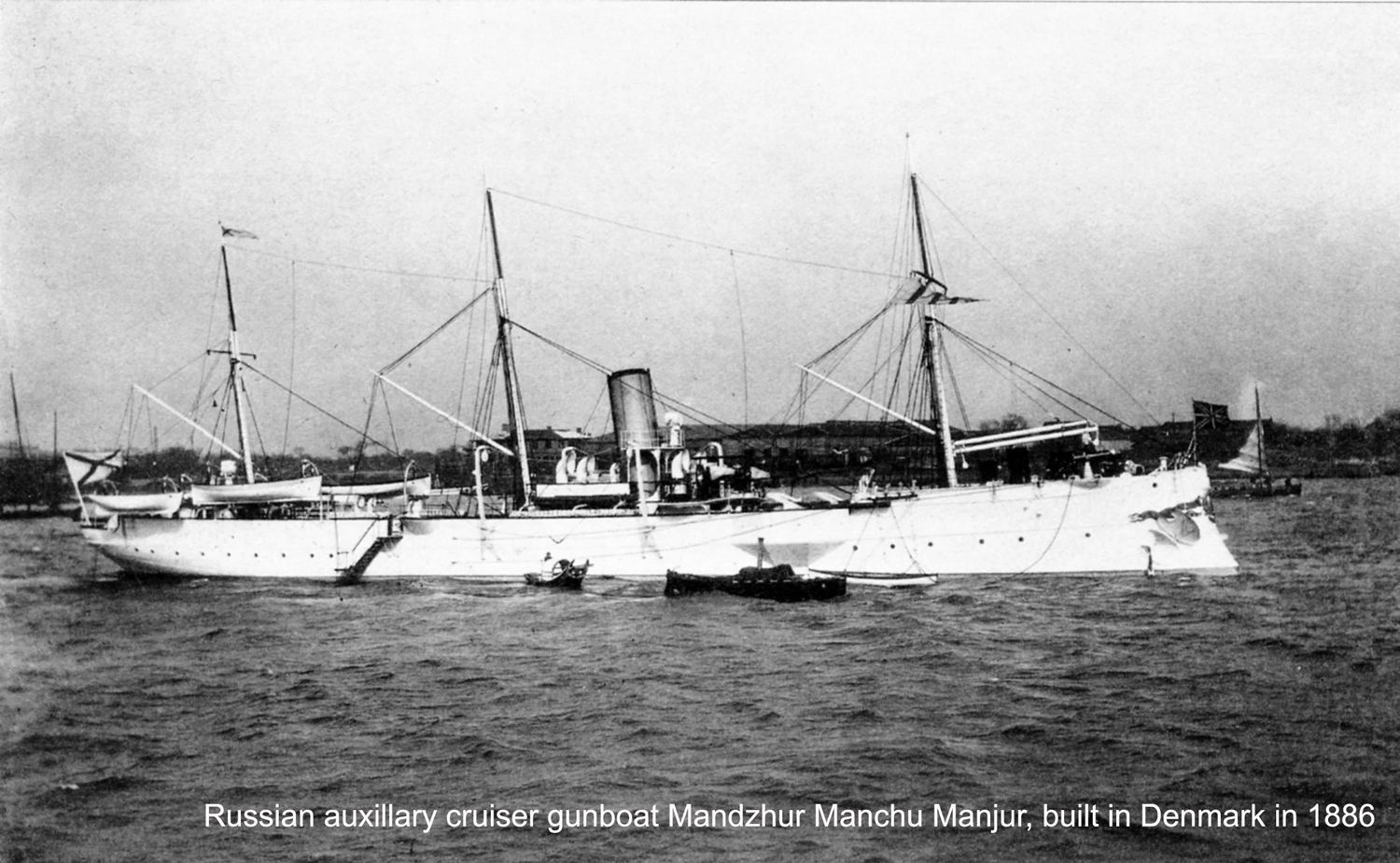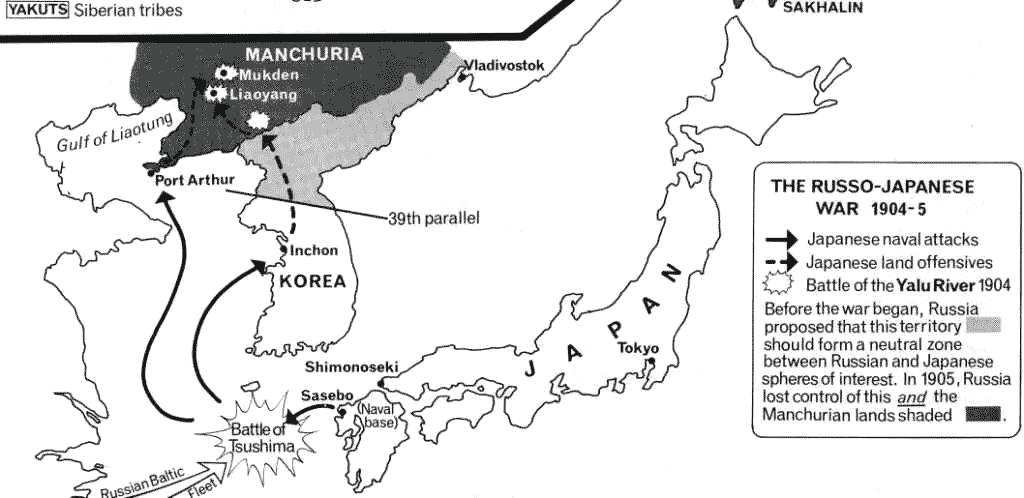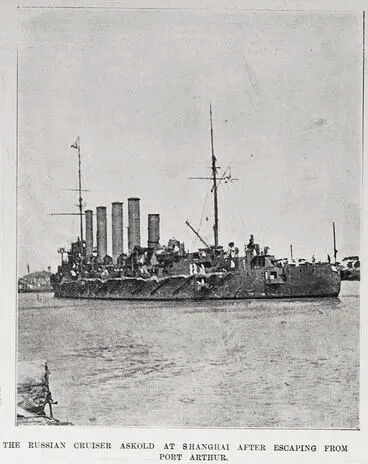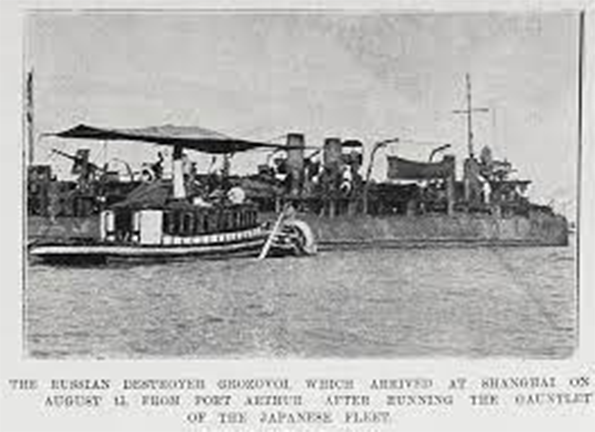1. The Russo-Japanese War
OWING to the situation at the end of the Boxer affair the clouds
of war began again to gather. It was a time of monstrous
complication between the chancelleries of Europe. Great
Britain had the Boer War on hand; Russia, Germany and
France were considering how our preoccupation could be
turned to their benefit and to each other's detriment; our
' splendid isolation ' principle could no longer work, so for
some years past there had been tentative approaches to an
alliance between us and Germany, which a mixture on the one
hand of procrastination and lack of unity of purpose and on the
other the ambition to challenge British sea supremacy rendered
futile; and so there grew the idea of a settlement of our
differences with France and of a rapprochement with that
country — which developed later.
That was roughly the state of affairs when, after the Boxers
had been put down, the Russians showed that where they were
they meant to stay — not only in Manchuria but in the north
of China proper. Out of this situation, and solving it, came,
in 1902, the Anglo-Japanese Alliance, which provided that if
either country was involved in war the other would come to its
assistance in the event of a third state intervening.
It is worth reviewing briefly what the policy of Russia was.

Up to 1860 her boundary was the Amur river and so her naval
port was Nikolaievsk — ice-bound for a large part of the year;
but then China, crushed by a war with France and England,
was forced by Russia to cede her seaboard from Nikolaievsk to
the Korean frontier, and so was created the naval port of
Vladivostok — a great improvement on the northern port.

But if one looks at the map it is plain how the Japanese contain
it; there is no egress to the ocean which is not dominated by
that country. It could not satisfy the Russians; and to the
southward lay Korea, studded with natural harbours, and
weak in her subjection to the double suzerainty of China and
Japan. So, as a first step — it was long before she had a chance
to attempt another — Russia tried to occupy Tsushima, a
Japanese island commanding the southern channel to the
ocean; but Great Britain shooed her off.
Then came the war of 1894 between China and Japan, when
the former ceded to the latter the Manchurian littoral from
Korea to the Liaotung Peninsula, including Port Arthur, the
Chinese naval port. The Russians did not like it. If
acquiesced in this cession would permanently block their game;
so they persuaded France and Germany — they nominally failed
with England — to join her in bringing pressure to make Japan
give up her spoil of war; and against such pressure Japan was
helpless. She retired and — wise little country that she was —
proceeded at once to make her preparations for the future.
China, of course, was grateful and so yielded to Russia's claim
to be allowed to build a railway across Manchuria from
Vladivostok to cut off the great arc that was caused by the
loop of the frontier formed by the Amur river; and where
that railway crossed the Sungari river was built the great
Russian city of Harbin.
Three years later, Germany started the policy of grab by
seizing Tsingtau because two German missionaries had been
murdered. Thereupon Russia demanded and obtained the
lease of Liaotung Peninsula — which so short a time before she
had made the Japanese relinquish — and the right to join it to
Harbin by rail. England followed with the lease of Weihaiwei,
as an offset to the Russian menace; France followed with the
lease of Kwangchow-wan, and Italy, without a shadow of
excuse, tried but failed to secure a lease of Sanmen Bay, in
Chekiang Province.(1)
1 — I advised the Chinese Admiral at this time that in case of the Italians
using force he should, regardless of all consequences, throw his little fleet
against them.
These facts, already told, require to be repeated here. Partly as a consequence of these indignities
there came, as has already been explained, the Boxer uprising
of 1900, and with it another chance for Russia to further her
desires. Realizing eventually that China was not to be partitioned, she limited her immediate ambitions to Manchuria;
but her threat extended to Korea. The representations from
other Powers on her acts resulted in an exhibition of tortuousness and mendacity that is possibly unique in the annals of
diplomacy. It was during the hatching of this situation that
Lord Salisbury referred to Count Ignatieff as the biggest liar
he had come across in his political experience.(1)
1 — Ten Years at the Court of St. James, by Baron von Eckardstein.
Russia threatened Korea, and, if she occupied that country,
she would dominate Japan and the Far East in general. That
she intended to do it was so evident that in February 1904 little
Japan struck at her giant neighbour.(2)
2 — An illuminating exposition of Russia's actions in this matter is given in
Count Witte's Reminiscences of the Reign of Nicolas II., of which the following
is a translated summary:-
When the Germans seized Tsingtau, Russian war vessels with troops
were sent to Port Arthur, and the Russian Government demanded a lease
of the Kwantung Peninsula: a demand which was at first indignantly
refused by the Empress Dowager. Count Witte, while disapproving of
the act, knew that the Tsar — egged on by the Kaiser for his own purposes
— was determined to have Port Arthur, even if the use of force was necessary
to that end; so he cabled a private message to Li Hung-chang pointing out
the inevitability of the occupation and promising him half a million roubles
for his support. That support was duly given and with success, and the
bribe was duly paid. " Thus," says Count Witte, " was taken that ill-
omened step which led to future developments culminating in the tragic
Japanese war and our internal troubles."
In view of the fact that only a few years previously Russia had been a
party to forcing Japan to relinquish her war-won occupancy of the Kwantung
Peninsula, Count Witte stigmatizes the Russian seizure as an act of unprecedented duplicity.
The unexpected seriousness of the attitude of Great Britain and Japan
about the seizure alarmed Muravieff, the Foreign Minister, for he had
assured the Tsar that it would cause no trouble. It was thus that, in fear
of a conflict with Japan, he abandoned the position of great influence which
Russia had gained in Korea; he withdrew his Adviser to the Korean
Emperor, his military instructors, and his other agents; and he signed
an agreement definitely admitting Japan's predominating influence in
the country.
It was early breach of that agreement that brought about the war between
Japan and Russia.
In the development of this situation I took a keener interest
and formed more definite opinions than in any of the problems
with which the Far East became involved. For this there were
several reasons. Although it was Chinese territory that was
in dispute, China was hardly a party to the quarrel. It was the
sick Chow Dog's bone that was being fought for by the Wolfhound and the Terrier. So with the elimination of that nightmare of intangibility, which China as an active factor always
means, the points at issue seemed — though they were not really
— comparatively simple. Then I was strongly antagonistic to
the Japanese. That was only natural by reason of their victory
over China; but of course I had admiration too and appreciation of the high chivalry which they had shown at Weihaiwei.
Of the justness of their quarrel there could be no question;
they were — though the immediate factor was the Chow Dog's
bone — fighting for existence. But I would not have them on
the continent — especially in China — at any price. Of the two,
as grabbers of Chinese territory, Russia would be the lesser
evil. I held this view most strongly and had maintained it
with some measure of success in my argument with Chirol. I
had sympathy with Russia in her railway scheme. Look at the
map and see the great temptation — when the break-up of China
was a seeming probability — to possess the country through
which that railway ran. So I considered that, if war — with all
the evils that would inevitably result, whoever won it — could
be averted by acquiescing in a Russian annexation of Manchuria
to the northward of her railway, it should be agreed to.
In July 1903 I went home on nine months' leave, accompanied by a sister who had been paying me a visit; we travelled
by the Siberian railway, and I saw something of Russian
preparations — the sidings were crammed with vanloads of men
and horses and field-guns. My sister became indisposed and
at St. Petersburg laid up, so I went to the Embassy for advice
about a doctor. There I met Spring-Rice, who in the absence
of the Ambassador was Chargé d'Affaires. I did not volunteer
my views, but he questioned me and showed great interest in
them. It happened that owing to the renovation of his quarters
he and the Military Attaché had their meals at the hotel where
we were staying, and I was asked to join them. At Spring-
Rice's request I wrote a memorandum on the situation, as I
saw it, for transmission to the Foreign Office. He warned me
that my association with them would make me subject to
suspicion by the Secret Service and that therefore I should on
no account keep a copy of my paper and that I should be careful
to burn my blotter. But I was vastly pleased with what
seemed to me the importance that had so unexpectedly fallen
on me. A memorandum to the Foreign Office ! I must keep
a copy, and I did so, placing it in my despatch-box, that in my
portmanteau, and both locked of course. Spring-Rice was
right; for just before we left St. Petersburg I discovered that
the paper had been stolen. It was well for me that the opinions
I expressed were so favourable to Russia; otherwise I should
have been arrested as a spy.
There remains a curious sequel to that episode. My companion in the coupé on that journey to the frontier was Garfield
— a Russian of English origin. Some years before I had known
him quite well in China; he was then connected with a
Russian Government mission in Korea; and now this seemingly accidental meeting. For was it accidental on his part?
I cannot give the reasons for the suspicion that grew on me;
they were vague but based on several facts, and in the aggregate
convinced me that Garfield had been sent to find out what he
could about me and my business.
Spring-Rice had arranged for me to see the Foreign Office;
I had some interesting conversations there and learnt that Lord
Lansdowne had read my memorandum; and then of course
they dropped me. I had one other shot at propaganda about
another matter — the saving of China from partition. Fearon,
a leading American merchant of Shanghai, was in London; I
gave him a memorandum which he delivered as a speech before
the Chamber of Commerce at New York; and later I had the
satisfaction of hearing Sir Robert Hart express pleasurable
surprise at the soundness of a merchant's views.
In December I realized that there was no longer any hope
that war would be averted, and, as I wished to have a hand in
neutrality affairs, I sacrificed two months of leave, and in
January left for China via Suez. I had added to my stock of
books on naval warfare and International Law, and on that
journey read them up and thought about how exterritoriality
would affect China's functions in neutrality. But war broke
out two weeks or so before I reached Shanghai; China had
made her declaration of neutrality, and Hobson, the Customs
Commissioner, was advising the local Chinese officials about
dealing with the Russian gunboat Manjur, which had taken
refuge there.

Hobson, a very senior man, had been one of
Gordon's officers in the Taiping days, and might have known
something about the practices of war; but the advice he gave
was radically wrong. Neutrality duties are those of an international policeman — they are essentially executive; yet, instead of acting on that principle and interning the vessel out-of-hand, he made the matter a subject of discussion between
the Taotai and the two belligerent consuls and consequently
at Peking between the Government and the two Ministers
concerned; and so the duty, which in any case would be A
difficult for China, was made much more so by this wrong
beginning.
I could not intervene; the thing had gone too far, and
besides I received instructions from Peking to attend to the
barrier removal at Canton called for by the Mackay Treaty.
That affair and others resulting from my sojourn in the South
employed me for over a year. I returned in May 1905, and
most opportunely from the standpoint of my neutrality
ambition, for a week later the transports of Admiral Rojestvensky's fleet arrived at Woosung, and a few days later that fleet
was defeated and annihilated off Tsushima — the island which
in 1860 the Russians had tried to occupy.

In the previous August the Russian war vessels Askold and
Grozovoi, having broken out of Port Arthur, which was invested by the Japanese, took refuge at Shanghai. Again there
was that exhibition of wrong-dealing with them, so now, with
the remnants of the Russian fleet seeking protection at Shanghai
and Chefoo, the time was ripe for me to take a hand. I discussed the matter with the Chinese Admiral and with Hobson,
and then I went to see the Viceroy at Nanking — the same
Chou-fu whom I had known at Chinanfu — and it was arranged
that he would instruct the Admiral to follow my advice. So I
took hold of the affair. Dr. Morse, in his International Relations
of the Chinese Empire, says: ' The Chinese authorities learnt
their lesson from this experience (their dealing with the Manjur
and other early cases for internment) and on the arrival of
Admiral Rojestvensky's fleet in Eastern waters, the Coast
Inspector, W. F. Tyler, ... was appointed as neutrality adviser
to the naval Commander-in-Chief. Towards the end of May
1905, Russian transports functioning with the Russian fleet
... arrived at Woosung. They were promptly declared war-vessels by Admiral Yeh, the Commander-in-Chief; and were
given the choice of proceeding or of being interned. Admiral
Yeh refused to discuss the matter with the Consuls or allow the
local Chinese civil officers to interfere. Recalcitrant Russians,
who after internment refused to give parole, were placed under
arrest; and the important principle was enunciated and given
effect to that in the performance of neutrality duties China was
in no way limited by the extraterritorial rights of the belligerents.'
There was something very fascinating in the exercise of the
authority and judgment which this work entailed.(1) It was an
uncommon sort of duty; it needed a knowledge of precedents
— I had them at my finger-tips — but above all it needed a
policeman's faculty of executiveness and not a lawyer's faculty
of arguing; and I never had a moment's doubt about it all. I
find this entry in my very meagre diary: ` Saw I.G.; he was
very nice and complimentary.'
1 — I find the following letter from the late Admiral Sir Gerard Noel,
who was Commander-in-Chief on the China station at the time. It expresses an opinion on internment which is interesting: —
` Nov. 20th, '05.
Herewith the papers you kindly let me see. I think that the action you
took in the case of the Russian ships, and your advice on the subject,
was exceedingly sound and good; and that you managed a difficult
business with considerable skill and adroitness, combining moderation
with a good show of firmness. I see nothing to object to in the treatment you recommended respecting interned ships. . . . As regards the
internment of warships in general, that is quite another question, and one
which I sincerely trust will never become a law amongst nations, unless it is
qualified by the obligation on the part of the Neutral to destroy such vessels.
I consider that the act of a belligerent seeking shelter from the enemy in a
neutral port to be contrary to the spirit of honourable warfare, and indeed
cowardly and reprehensible, and should certainly be given no encouragement. It is the business of a warship — as part of the territory of the country
to which she belongs — and therefore not rightly subject to the protection
of internment — to go out and fight or surrender to her enemy.'
In this chapter I attempt to give a silhouette of history to
serve as a setting to my story, and there are other chapters
where I do the same; but all the time I am conscious of the
impossibility of history to really tell the truth. One picks out
certain features which seem salient because one knows about
them; but in reality they are no more than mnemonic labels
of one's meagre knowledge. What seems salient has no great
relation to the mass of complicated factors that really rule a
situation.
#







